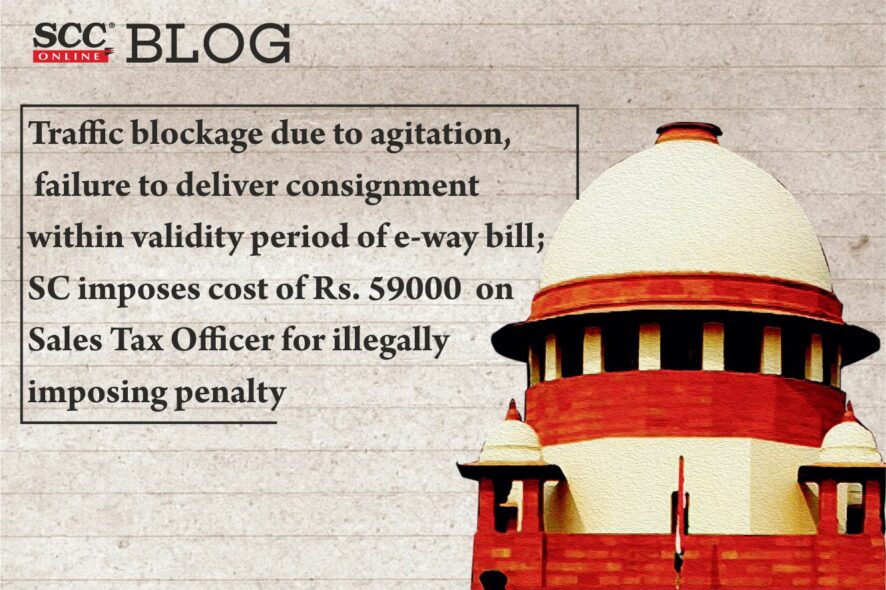Supreme Court: While addressing the appeal against Telangana High Court’s order imposing costs of Rs. 10,000 on Asst. Commissioner of Sales Tax, the Division Bench of Dinesh Maheshwari and Hrishikesh Roy, JJ., refused to interfere with well-considered and well-reasoned order of the High Court and instead proceeded to enhance the cost by Rs. 59000. The Bench remarked,
“…error, if any, on the part of the High Court, had been of imposing only nominal costs of Rs. 10,000 on the respondent…”
The Bench held that the attempted inference on the part of the respondent that the writ petitioner was evading tax because the e-way bill had expired a day earlier was not only baseless but also the intent behind the proceedings against the petitioner were questionable per se, particularly when it was found that the goods in question, after being detained were strangely kept in the house of a relative of the respondent for 16 days and not at any other designated place for their safe custody.
The respondent-petitioner, a Private Limited Company had made an intra-State supply of paper to M/s. Sri Ayappa Stationery and General Stores and had also generated an e-way bill dt.04-01-2020. The goods were delivered to a transporter for making delivery to the consignee by an auto trolley however, due to Anti CAA protest traffic was blocked and the auto trolley driver could not make the delivery, next day being Sunday the driver took the trolley for delivery on the next working day, i.e. 06-01-2020.
It was the case of the petitioner that the auto driver was wrongfully detained by the Deputy State Tax Officer alleging that the validity of the e-way bill had expired proposing to impose tax and penalty. The petitioner revealed that the paper boxes were unloaded by the appellant-respondent at a private premises in the house of respondent’s relative without tendering any acknowledgment of receipt of detention of the goods in his custody, and subsequently, the auto trolley driver was released.
Considering that there was no material before the appellant-respondent to come to the conclusion that there was evasion of tax by the petitioner merely on account of lapsing of time mentioned in the e-way bill because even the appellant-respondent did not say that there was any evidence of attempt to sell the goods to somebody else on 06.01.2020, the High Court had held that on account of non-extension of the validity of the e-way bill by petitioner or the auto trolley driver, no presumption could be drawn that there was an intention to evade tax.
The High Court had set aside the levy of tax and penalty of Rs. 69,000 and imposed costs of Rs. 10,000 on the appellant-respondent payable by the petitioner within four weeks. Deprecating the conduct of the appellant-respondent and blatant abuse of power in collecting from the petitioner tax and penalty both under the CGST and SGST and compelling the petitioner to pay Rs.69,000, the High Court remarked,
“We deprecate the conduct of respondent in not even adverting to the response given by petitioner to the Form GST MOV-07 in Form GST MOV-09 and his deliberate intention to treat the validity of the expiry on the e-way bill as amounting to evasion of tax without any evidence of such evasion of tax by the petitioner.”
Approving the reasoning of the High Court, the Bench said,
“The analysis and reasoning of the High Court commends to us, when it is noticed that the High Court has meticulously examined and correctly found that no fault or intent to evade tax could have been inferred against the writ petitioner.”
However, on the amount of costs the Bench opined that it was rather on the lower side considering the overall conduct of the respondent and the corresponding harassment faced by the writ petitioner. Accordingly, the Bench imposed a further sum of Rs. 59,000 on the appellant-respondent toward costs, to be paid to the writ petitioner over and above the sum of Rs. 10,000 already awarded by the High Court.
Lastly, opining that even the instant appeal was misconceived, the Bench made it clear that the State would be entitled to recover the amount of costs, after making payment to the writ petitioner, directly from the person/s responsible for the entirely unnecessary litigation.
[CST v. Satyam Shivam Papers (P) Ltd., 2022 SCC OnLine SC 115, decided on 12-01-2022]
Appearance by:
For Appellants: P. Venkat Reddy, Prashant Tyagi, P. Srinivas Reddy, Advocates and M/S. Venkat Palwai Law Associates, AOR







